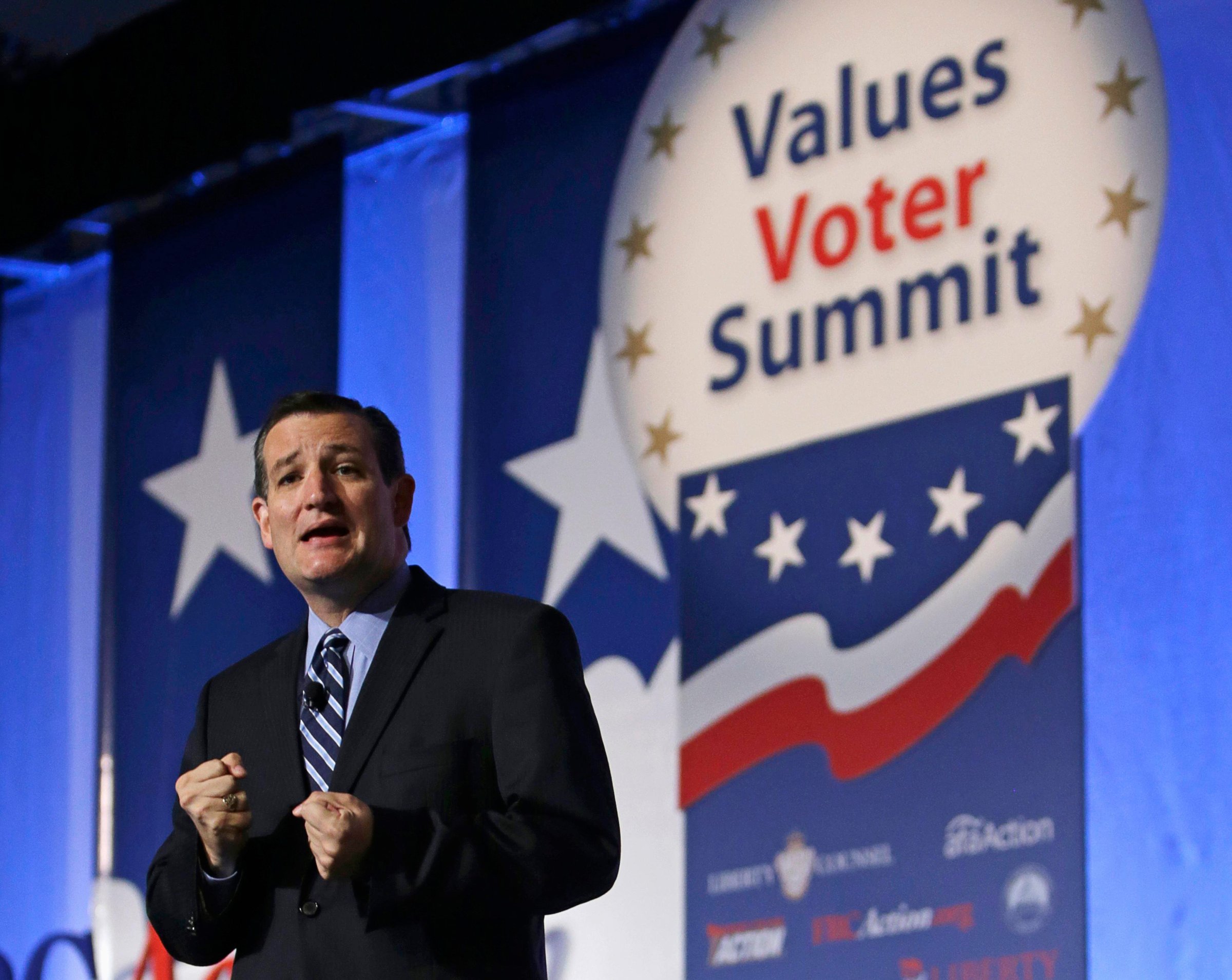
Ted Cruz and Rand Paul, two Tea Party senators in the hunt for the White House, find themselves in a nearly identical position these days. Both sons of celebrated conservative leaders, they regularly speak at the same events, criticize the same Democratic President with a similar message of back-to-basics constitutionalism, and poll nationally at about 10% among Republicans in the way-too-early 2016 polls.
But on Friday, as conservative Christians gathered in Washington for the Values Voter Summit, their differences were far more apparent than their similarities. Paul stood behind the podium in blue jeans, quoting the Founding Fathers and modern authors off a teleprompter, ever the iconoclastic intellect. Cruz roamed the stage in a boxy suit, preaching a passage from Psalms again and again in a call for spiritual rebirth.
Both cast the political crisis now facing the country as a crises of the spirit, but from there they began to diverge. While they both boasted of anti-abortion credentials, only Cruz raised the issues of gay marriage and Iran, building his nearly hour-long address around Psalm 30:5, “Weeping may last for the night, but a shout of joy comes in the morning.” The night, he said, was the current rule of a Harry Reid in the Senate and Barack Obama in the White House, and dawn would come in two stages, in this year’s midterm elections and in 2016, with twin Democratic defeats.
“How do we turn this country around? We offer a choice not an echo,” Cruz said, offering himself as a sort of condensed Republican, without the fluff of the others. “We defend the values that are American values. We stand for life. We stand for marriage. We stand for Israel.”
Paul was introduced to the stage with a different sort of branding. “He is on the edge, he has an edge and it gives him and edge,” went the sales pitch, and he did his best to cast himself as a non-conformist over the course of about 17 minutes. At multiple points, he noted that both political parties had failed to adhere to the proper path, which he described as faith in God and close adherence to the Constitution. “What America needs is not just another politician or promises,” he said. “What America really needs is a revival.”
It was a neat recasting of the revolution metaphor that has accompanied his—and his father Ron Paul’s—rapid political rises over the last decade. Unlike Cruz, who limited his foreign policy criticism to the President and the lack of effort to make Christian persecution a priority in diplomatic relations, Paul called for a shift in the way the nation approaches intervention, arguing that even detestable secular dictatorships in the Middle Sast were preferable to the chaos following their toppling. “It’s time to put a stop to this madness,” Paul said, “And take a good heard look at what our foreign policy has done.”
Paul has generally been more supportive than Cruz of efforts to negotiate a resolution to the nuclear stand-off with Iran, and chose not to raise the issue specifically before the Christian, Zionist audience. Cruz, by contrast, joked of U.S. diplomats “swilling chardonnay in New York City” with their Iranian counterparts.
Cruz spoke at length about his pastor father, Rafael, his journey to the United States from Cuba and his Christian faith. Paul made no mention of his father, who won delegates for both the 2008 and 2012 Republican National conventions.
Judging from the noise of the applause, at the Omni Shoreham ballroom, Cruz’s presentation was received with somewhat more enthusiasm, though both were rewarded at the end with standing ovations. But the two men had come to the room with different missions. For a Cruz campaign, Christian conservative support will have to be core pillar of support. For Paul, the focus in on assuaging Christian conservative doubts as he focuses on building out new parts of the electorate from more libertarian leaning Americans.
“Where the spirit of the lord is there is liberty,” Paul said in conclusion, quoting from Corinthians 3:17. Then he said the opposite was also true. “Where there is liberty, there is always space for God.”
The message: The conservative Christian community, long an anchor of the Republican Party, has nothing to fear from the new edgy candidate in their midst.
More Must-Reads from TIME
- Cybersecurity Experts Are Sounding the Alarm on DOGE
- Meet the 2025 Women of the Year
- The Harsh Truth About Disability Inclusion
- Why Do More Young Adults Have Cancer?
- Colman Domingo Leads With Radical Love
- How to Get Better at Doing Things Alone
- Michelle Zauner Stares Down the Darkness
Contact us at letters@time.com